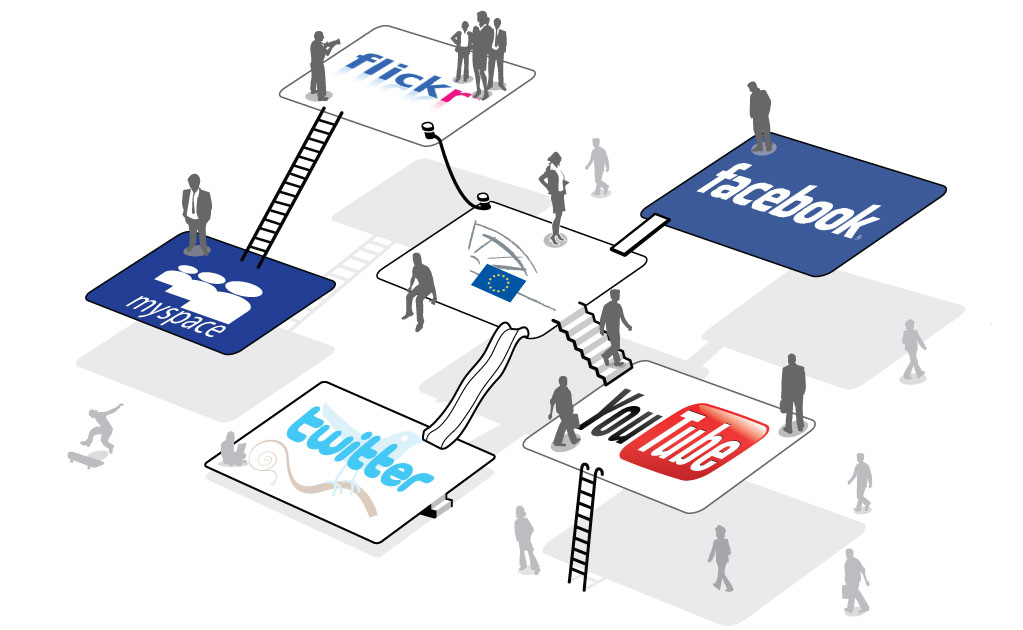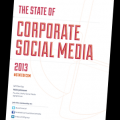By Nick Johnson - April 3rd, 2013
In this week's review of the week's big corporate social media stories, we look at picking the right platforms for your content, organisational changes wrought by social media's rise, and a lot more!
Pick the Right Platform: Choosing the network that works best with your content

Over at the Marketing Sherpa blog, Jonathan Greene gives his opinions on choosing which social platform is best suited to your campaign.
His view?
Facebook: Your audience doesn't expect marketing messages. It expects relatively unstructured discussions of varying depth on pretty much any topic. You've got to be very interesting to get any traction
Twitter: You've got pretty much no time. Make a big impact quickly, to justify further exploration.
LinkedIn: Your audience is pitching itself. Any contact you have with them has to fit within that context.
While it's undeniably important for companies to pick the right platform to distribute their content, far more companies appear to be falling at earlier hurdles. What are they?
The wrong content for your audience
There are far too many examples of companies picking a type of content, or a focus for content, that simply won't work for an audience. What do I mean?
TYPE OF CONTENT FAIL: One could point to QR codes being put on menus for Radisson Edwardian restaurants. Ok - one gets to see one's food being prepared. But would anyone do that? Take out their phone at the table, open a QR code reader and sit watching the lamb being cooked while their dining partner gets increasingly annoyed? Surely better to put the QR codes somewhere that doesn't take people away from another activity. In the lift down to the lobby, for instance?
FOCUS OF CONTENT FAIL: The point of content marketing is to attract and begin a relationship with people who are potentially going to buy your product. It's not simply about collecting data, it's about getting the RIGHT people into the top of your marketing funnel. That means your content HAS to be aligned with your product. Colgate's 'Oral and Dental Health Resource Center' works. Seat's free music for car lovers? Not so much.
What do you think? We'd love to hear your views on both the right platforms for your content, and common content marketing fails..
61% of business say that social has impacted on internal organisational structures
 According to our newly released State of Corporate Social Media briefing, nearly two thirds of companies have experienced meaningful change to their organisational model thanks to the rise of social. What has that meant, in practice? A few things:
According to our newly released State of Corporate Social Media briefing, nearly two thirds of companies have experienced meaningful change to their organisational model thanks to the rise of social. What has that meant, in practice? A few things:
- Social stands alone: Not only do 92.5% of companies now have at least one person working specifically on social, but 18% of them report directly to the CEO
- Social must be integrated: 75% of companies plan on using social for increased customer insight in 2013, 67% for customer service delivery, 49% for better employee engagement
- Different departments are forced to work more closely: There's no point in the Comms department creating a strong brand message, the marketing team departing from it with product campaigns, and the customer service team speaking with an entirely different voice when dealing with customer queries. For a unified consumer experience, there must be unification internally, too.
For more from the State of Corporate Social Media briefing, download your copy here.
Marketers: Speak when you're spoken to
 Altimeter Group have just released new research suggesting that 51% of customers do not want companies 'eavesdropping' on their conversations.
Altimeter Group have just released new research suggesting that 51% of customers do not want companies 'eavesdropping' on their conversations.
This in itself presents a looming problem. The potential of big data, and of better social monitoring, is well understood. It's a fantastic way for large companies to get closer to consumers, learn more about them and align better with them - in a way that was impossible previously. 42% of companies in the Altimeter report have said that an extension of this monitoring is a key priority in 2013.
And yet 43% of consumers believe this would constitute an intrustion of privacy.
It's an example of one of the (many) fine balances that the social media director is responsible for (the others focusing on centralised vs decentralised internal organisation, local vs global messaging, integrated versus standalone campaigns).
Not only do customers exhibit considerable wariness at your listening in on their conversations - they also don't want you getting in touch proactively.
64% expect that a company should only get in touch with them in response to queries or comments. This will come as a blow to the many companies (specifically in Pharma) who feel that proactive communication is essential. If you work for a Pharma company and see someone talking about your drug not working on Facebook, yet also showing they're not taking it in the right way, you'd want to get involved, right?
There's more on the findings from this Altimeter/JD Power study over at Forbes. And if you're a social media director struggling with this issue, then we have several discussions covering the topic at the Corporate Social Media Summit in New York.
Views from National Public Radio's new CMO on marketing in digital world
 Forbes again - this time they've conducted a great interview with the new CMO from NPR over in the States, Emma Carrasco. Some highlights?
Forbes again - this time they've conducted a great interview with the new CMO from NPR over in the States, Emma Carrasco. Some highlights?
- Digital is changing business (duh): NPR created the new position of CMO to deal with rapidly shifting expectations and behaviours from key customers
- Digital tracking allows a brand with a loyal tribe to know exactly HOW loyal they are: Your ability to measure is considerably enhanced, and one can get far more accurarte soundings on loyalty and brand value when looking at digital engagement
-
Key focuses for NPR's CMO (and you)?
- Drive brand awareness
- Drive engagement
- Measure engagement and learn from it
It's an illuminating piece, and you can read it here.
Next Reads
June 2014, New York
Become a social business: For superior marketing response, sharper corporate decision-making, enhanced innovation and a happier, more loyal customer
Brochure Programme